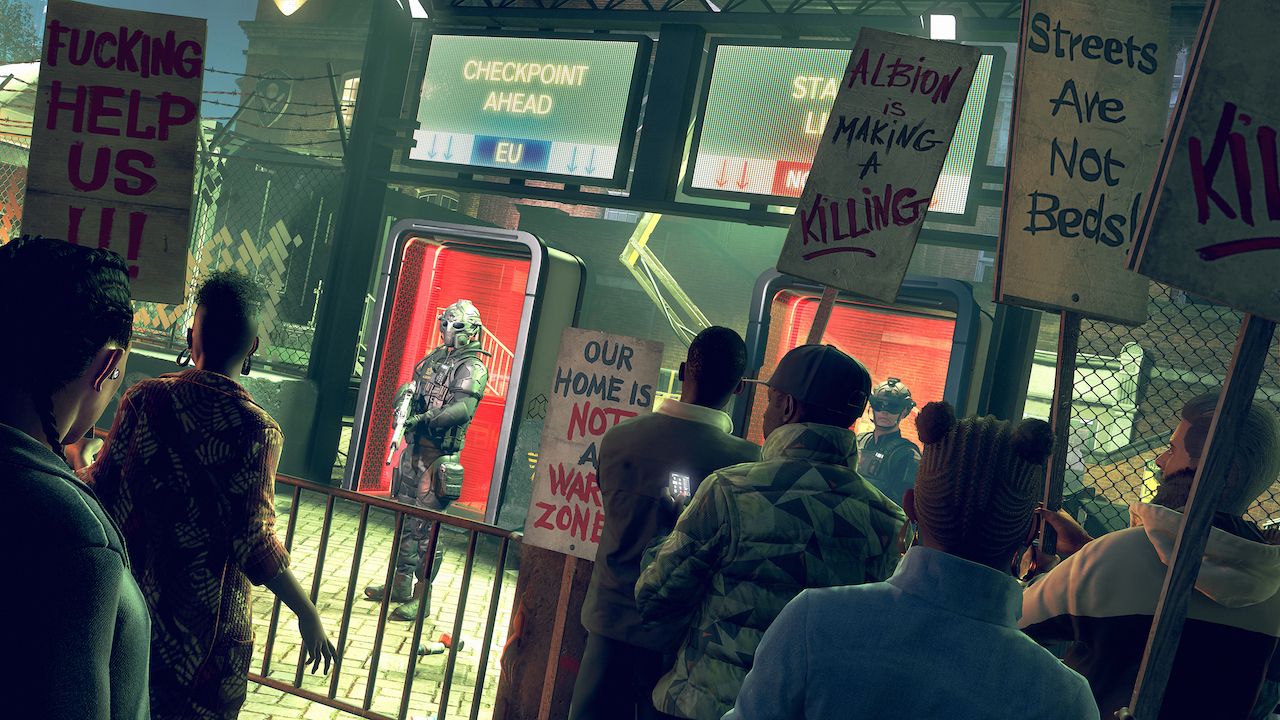In Watch Dogs: Legion, a diverse coalition that includes blue-collar and white-collar workers mobilize against an authoritarian regime. Almost every square inch of the frame at all times contains some sort of politically charged message, with signs and graffiti that have phrases like "ABOLISH POLICE STATE." And if the overtones weren't obvious enough already, Ubisoft's E3 2019 stage presentation pitching the game straight up namedropped Brexit.
Despite all of this, developers behind the game stopped short of straight up saying that Watch Dogs: Legion makes an explicit political statement.
After playing an impressive extended demo of the open world game, I briefly sat down with lead producer Sean Crooks, who answered my questions about the game's depiction of London and the variety of characters that players can recruit and control. Crooks described how current ongoing events like the Brexit saga influenced the near-future London crafted for the game, and how important the theme of solidarity within this resistance of workers against the government was to the story. It certainly sounded like a political statement to me, and given Ubisoft's history of claiming a lack of such for their titles, I followed up by asking if Watch Dogs: Legion had one.
Crooks answered with the following:
Well, it's making a statement about being individuals getting together with common values and fighting towards an important goal. That's really what we want our fans and our players to take away from Watch Dogs: Legion.
Despite all of the provocative and pointed messages spread throughout the world of Watch Dogs: Legion, the game has more of a general statement about unity. This reluctance to lock onto a clear political message echos discourse regarding previous Ubisoft titles Far Cry 5 and Tom Clancy's The Division 2, both featuring memorable pitches and provocative imagery that reflect on the real world despite developer claims that neither had an explicit political statement either.
Ultimately, it appears that Ubisoft wants players to draw their own conclusions about the material presented in the game. It would be difficult to not draw parallels between the working class protagonists and the authoritarian antagonists to any real-life figures or powers-that-be, especially given that a mention of Brexit and the state of the world in the midst of that saga was literally part of the pitch behind this game. It does match with words from Tommy Francois, Vice President of Editorial at Ubisoft, in a recent blog post from the game company.
...our goal is to give players all the information we can, and then let them choose which sides of our game worlds they want to explore. We want them to decide what they like, what they don't like, and if and how to change their minds or the way they play based on that information. It's about more freedom for the players.
... The idea for us is that you are not a spectator. You are an actor. Usually, when you're a spectator and you watch a movie, you will see one point of view per movie – maybe a few. We believe that games should offer a 360-degree view of life, should let people interact with all points of view.
If my game was set during the Vietnam conflict, for example, we would want the Viet Minh, the Viet Cong ... basically everyone's point of view. And that relates back to people making up their own opinions and our ability to create more mature games that are nuanced, versus being black or white.
At some point, it becomes increasingly harder to maintain this sense of neutrality, especially when a game's story is very overtly about the working class vs. an authoritarian government. While Legion may not do so, writers operating with that philosophy could craft narratives that are sympathetic towards the perceived "bad guys," which could be a negative influence to more impressionable players. It's also up for debate whether or not all "points of view" are worth telling—it would be like making a World War II game that had you play from the perspective of both Allied soldiers and Nazis in a misguided and dissonant attempt for "balance" and "nuance."
Whatever the case for Watch Dogs: Legion may be, it is impossible to make the final judgment about whether it has something to say about the state of our world or if it uses that familiar imagery as set dressing until we have the final game in our hands. And to be fair to the developers that I spoke to during E3, they may very well have strong political opinions that cannot be made clear from any sort of company-wide directives.
We'll see soon enough when Watch Dogs: Legion releases on PC, Xbox One, PS4, and Stadia on March 6, 2020. Be on the lookout for my E3 2019 impressions on the game's complex and choice-driven gameplay.

